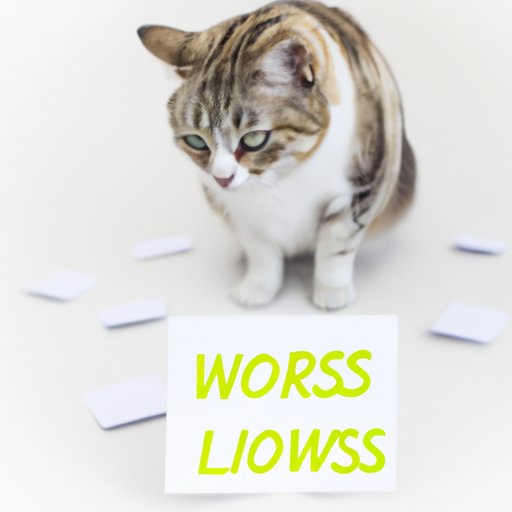
I. Introduction
If you have noticed that your cat has put on a few extra pounds, you are not alone. According to the Association for Pet Obesity Prevention, more than half of all cats in the United States are overweight or obese. While some people may find a chubby cat adorable, carrying extra weight can lead to serious health complications for your furry friend. In this article, we will provide tips and strategies to help you get your cat to achieve a healthy weight.
II. Portion Control
One of the most important steps in a healthy weight loss plan for your cat is portion control. Free feeding, where food is available all day, can lead to overeating and eventual weight gain. Accurate measuring of food portions is essential for maintaining a healthy diet. Using a kitchen scale can be a useful tool to ensure that you are feeding your cat the appropriate amount of food for their weight and activity level.
Treats can also play a role in portion control. Limiting the number of treats your cat receives can help to cut excess calories from their diet. Consider using healthier options such as high-protein treats or replacing treats with occasional playtime or affection.
III. Active Playtime
In addition to a healthy diet, exercise is also important for weight loss for cats. Playtime is not only enjoyable, but it also provides physical activity for cats. Scheduling regular playtime sessions can help keep your cat active and healthy.
Introducing new and exciting toys can encourage your cat to play. Consider using interactive toys such as laser pointers or toys attached to strings to keep your cat engaged. Playtime can also be used to bond with your cat.
IV. Switching to Low-Calorie Foods
Low-calorie foods can be a helpful tool in achieving weight loss for your cat. These foods are formulated to contain fewer calories and can help your cat feel full and satisfied. It is important to note that not all low-calorie foods are created equally. It is essential to choose a high-quality food that still meets your cat’s nutritional needs.
When transitioning to a new food, it is essential to do so gradually. A sudden change of diet can result in digestive problems. Gradually introducing the new food over several days can help your cat adjust to the new diet more easily.
V. Gradual Dietary Changes
Changes in diet should be made gradually to allow your cat’s digestive system time to adjust. Introduce new foods slowly by adding a small amount to their current diet and gradually increasing the amount over time. Keep an eye out for any signs of discomfort or digestive issues, such as vomiting or diarrhea, that may indicate the new diet is not well tolerated.
VI. Dietary Supplements
Dietary supplements can be a helpful addition to your cat’s weight loss plan. Some supplements, such as L-carnitine, can increase metabolism, while others, such as fiber, can increase fullness and reduce the number of calories your cat consumes. It is important to use supplements safely and consult your veterinarian before adding any new supplements to your cat’s diet.
VII. Monitoring Progress
Tracking your cat’s weight loss progress is essential to ensure that the plan is effective. Regular weigh-ins can help to note progress and make any necessary adjustments to the diet or exercise plan. It is also important to monitor your cat for any signs of discomfort, such as lethargy or decreased appetite, during the weight loss process.
VIII. Consult a Vet
Working with a veterinarian can help create a personalized weight loss plan that meets your cat’s individual needs. A vet can provide advice on the best diet, exercise, and supplement plan for your cat’s specific condition. They can monitor weight loss progress and adjust the plan as needed.
IX. Conclusion
Helping your cat achieve a healthy weight is essential for their overall health and well-being. With a combination of portion control, exercise, and dietary changes, your cat can reach a healthy weight and enjoy a longer and happier life. Don’t hesitate to consult with your veterinarian for personalized guidance.





